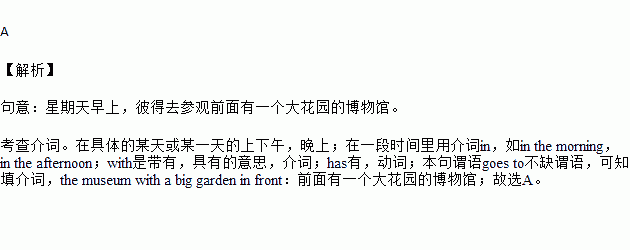题目内容
________ Sunday morning, Peter goes to visit the museum _________ a big garden in front.
A.On; with B.On; has
C.In; has D.In; with
 阅读快车系列答案
阅读快车系列答案任务型阅读
The first World Cup was held in Uruguay in 1930.This World Cup has a different meaning,1930,exactly 100 years of independence of Uruguay.In the final,Uruguay beat Argentina 4-2 in front of a crowd of 93,000 people,and became the first winner of the World Cup.
The 2018 World Cup in Russia takes place on June 14.It is the first time the tournament(锦标赛)has been held in Eastern Europe.
The 32 qualified teams were divided into eight groups of four teams each.Host Russia were naturally the top seed in Group A. A group of death in a multi?stage tournament is a group which is unusually competitive,because the number of strong competitors in the group is greater than the number of qualifying places available for the next phase of the tournament.
The World Cup is a gold trophy that is awarded to the winners of the FIFA World Cup association football tournament.
阅读短文,完成下面表格,每空一词。
1.On the World Cup | |
the first World Cup | 2. became the first nation to win a World Cup. |
the 2018World Cup | Russia is the first to3.the tournament in Eastern Europe. |
common sense of the World Cup | The 4. qualified teams were divided into eight groups of four teams each. A group of death is a group which is unusually competitive,5.of too many strong competitors in the same group. |

